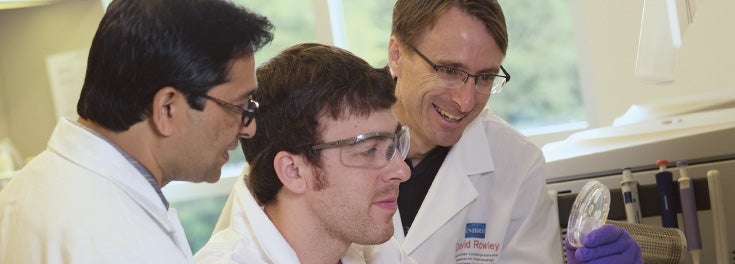
In science, amazing discoveries can begin in familiar places—in the ocean, in the plants around us, just about anywhere in the natural world. And at URI, that’s exactly where a group of scientists and their students are looking for newer and more effective medicines to treat infection and a variety of human diseases.
Pharmacognosy Professor David Rowley and his students work with microbes from the ocean as a potential source for new infection-fighting antibiotics. Right now, they’re studying bacteria found in mud sediment from a remote region of the South Pacific. He says preliminary results are promising, with microbes that are “perhaps unlike any others that have been investigated.”
Professor Navindra Seeram and his students are focusing on maple syrup, pomegranates, berries, and other medicinal plants for their potential preventive and/or therapeutic effects against cancer, diabetes, and Alzheimer’s disease. “A vast majority of traditional medicines are plant-derived extracts. Our goal is to understand how molecules in nature behave in order to provide new drugs,” says Seeram, who has attracted international recognition for his discovery of 54 beneficial compounds in pure maple syrup—including five previously undiscovered molecules.
Our work happens right at the interface of chemistry and biology, and our students get a big picture perspective of how science happens.
We call Professors Rowley and Seeram and their students our Natural Products Group. As the premier natural products research group in the Northeast, it has the largest number of pharmacognosy researchers in the area. It is also one of the most interdisciplinary groups.
“Our work happens right at the interface of chemistry and biology, and our students get a big picture perspective of how science happens. We find the molecules in nature, and then our biochemistry collaborators help us determine how they work in nature. We answer biological questions with a chemistry approach,” says Professor Rowley. An added plus—students can move between labs within the Natural Products Group, experiencing different areas of pharmacognosy.
The Natural Products Group also collaborates on projects with a growing number of companies and with other scientists within the University. Ocean Spray Cranberries, Inc. has funded the group’s work on the beneficial agents found in cranberries. Rhode Island Sea Grant is supporting Professor Rowley’s research on the chemistry of bacteria that promote disease-resistance in oysters, and the National Science Foundation and National Oceanic and Atmospheric Administration have also supported the Natural Products Group. Professor Seeram’s recent work on maple syrup has been supported by grants from Canada’s agriculture agency. Within the University, the group has worked with URI Food Sciences Professor Chong Lee, to discover that some of these maple syrup compounds inhibit enzymes, which is important in the management of type 2 diabetes. And Professor Rowley’s team regularly collaborates with oceanography professors in pursuit of biomedical applications of marine organisms. “URI is at the critical size for our work. We have all of the important disciplines and intellect for pharmacognosy, plus the ideal size for collaboration,” he says.
The work of the Natural Products Group is pretty revolutionary, but the fact is, URI has a long, rich history in pharmacognosy. A scientist named Heber W. Youngken Sr. wrote the “bible” of pharmacognosy in 1921. His son, Heber W. Youngken, Jr., a premier natural chemist, became the first dean of the URI College of Pharmacy in 1957. URI hosted the very first “Drugs from the Sea” conference in 1967. And beginning in the 1970s, URI Professor Yuzuru Shimizu’s descriptions of numerous red tide toxins plaguing New England coastlines brought international attention to URI’s pharmacognosy efforts.
“The earliest conversations about drugs from the sea happened at URI. We are standing on the shoulders of giants here,” says Professor Seeram. The Natural Products Group professors and their students—and the students to come—are continuing this great tradition, working to discover the next generation of medicines and molecules to benefit human health.
Pictured above: Pharmacology Professors David Rowley and Navindra Seeram work with graduate student Robert Deering, who also earned his Pharm. D. degree at URI.
Related Links:
Is maple syrup the new super food? Toronto Globe and Mail
Maple syrup tested as champion food, Canadian Broadcasting Company
URI’s College of Pharmacy bolsters natural products chemistry work
URI student unlocking secrets of the Jamun berry to treat cancer
Why an all-superfoods diet is a mistake, U.S. News & World Report article
